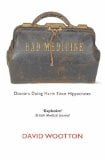Bad Medicine: Doctors Doing Harm Since Hippocrates
by David Wootton
Oxford University Press, £9.99 (pb), ISBN 978-0-19-921279-8
The main theme of this book is that, until the modern period, beginning in the middle of the 19th century, professional medicine did, on balance, more harm than good. A subsidiary theme is that very often, even when the knowledge which might improve things was available, it was neglected for long periods. Real change was dependent in particular on, first, the use of controlled experiments and statistical comparison, and second, the germ theory of disease. Two especially significant points were, respectively, John Snow’s systematic analysis of the incidence of cholera in the 1850s, narrowing the causes down to the water supply, and Joseph Lister’s introduction of antiseptics from 1865. Before this, medicine derived largely from the Hippocratic tradition that diseases were not entities in themselves, but mainly or wholly due to imbalances in the individual (originally, in the ‘humours’). The main methods were bleeding, purges and emetics, especially the first, which was also particularly harmful. One might note, however, that current thinking is reinstating the individual, for example in variations in genetic susceptibility to illnesses, and the effects of life-style, e.g. obesity.
To explain the lack of progress, Wootton offers a combination of factors, including vested interests, difficulties of communication, mere accident, etc. He mentions, but could have developed further, the whole question of professionalism, which can raise standards but can also produce stagnation and self-interest. Another large question is the relationship of medicine, magic and religion, but one book cannot deal with everything. Wootton also criticizes other historians of medicine, though, oddly, usually not naming them. He objects both to a Whig view of natural, if not steady, progress and a relativist view that the past must be judged by its own criteria. He rightly warns against assuming that the ‘medicine’ of past times was essentially the same thing as we mean by the word, or at least an early attempt at it. He seems to be aiming at both a general and a specialist readership, and the writing is certainly clear and always interesting. Curiously, there is no bibliography, only “further reading”. There is also a website, www.badmedicine.co.uk.
John Radford


